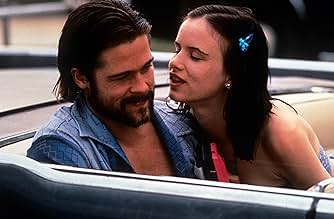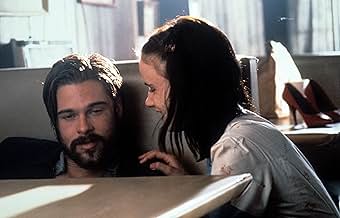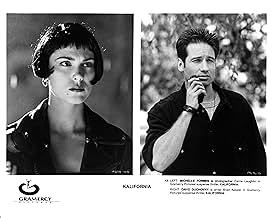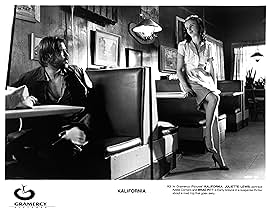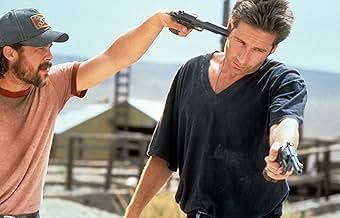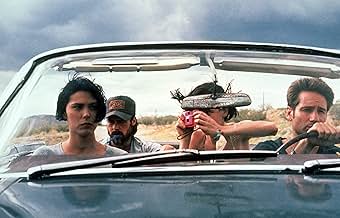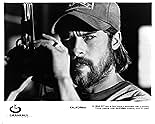A journalist duo goes on a tour of serial-killer murder sites with two companions, unaware that one of them is a serial killer himself.A journalist duo goes on a tour of serial-killer murder sites with two companions, unaware that one of them is a serial killer himself.A journalist duo goes on a tour of serial-killer murder sites with two companions, unaware that one of them is a serial killer himself.
- Awards
- 4 wins & 4 nominations
Kathy Larson
- Teenage Girl
- (as Catherine Larson)
James Michael McDougal
- John Diebold
- (as J. Michael McDougal)
Bill Crabb
- Middle-Aged Farmer
- (as Bill Crabbe)
Storyline
Did you know
- GoofsTowards the end of the movie, Early violently smacks his gun across Brian's temple, above his left eye. His temple is shown in a subsequent shot as very bloody, yet there is no visible injury (or bandage) in that spot a short time later as Brian is shown driving down the road chasing after Early & Carrie.
- Quotes
Brian Kessler: When you dream there are no rules. People can fly. Anything can happen. Sometimes there's a moment as you're waking and you become aware of the real world around you, but you are still dreaming. You may think you can fly but you better not try.
- Alternate versionsEuropean release and US video/Laserdisc Unrated versions feature about one minute of additional violent footage not present in US theatrical R-rated version. Unrated version of sex scene between Brian and Carrie is slightly longer and more explicit than the R rated version.
- SoundtracksLook Up to the Sky
Written by Angelique Bianca
Performed by The Indians
Courtesy of Polydor Records
By Arrangement with PolyGram Special Markets
Featured review
In the same vein as Natural Born Killers, another movie that was not so popular with critics because of its excessive violence but that I also loved, Kalifornia is a movie that clearly glamorizes violence, but I like to think that it turns that around in the final act. Kind of like how The Basketball Diaries glamorizes drugs at first, but shows the bad side by the end of the movie, which is far worse than the good side is good. David Duchovny plays Brian Kessler, an artistic yuppie with an even more artistically yuppie girlfriend, who is into that violent sexy black and white photography generally reserved for, I don't know where, places where nudity passes for art. Maybe it really does and I just don't understand it. At any rate, Brian and Carrie (Duchovny and Michelle Forbes, who fits the role flawlessly), make the perfect couple to go on a documentary tour of famous murder sites. Brian, the writer, will write the book, Carrie can take the pictures.
Being artistic types, Brian and Carrie are not quite financially prepared for such a trip, so they put out an ad for someone to share gas and travel expenses, and are contacted by Early Grace and Adele Corners (Brad Pitt and Juliette Lewis). Early is on parole and assigned to janitorial work at the local university by his parole officer, sees the ad on a bulletin board, and decides to leave the state for a while, violating his parole but also leaving the scene of his landlord's murder so he won't have to deal with a pesky murder investigation. Two birds with one stone, you know.
The movie has a curious ability to portray two stereotypes, the artsy yuppies and the greasy trailer trash, without resorting to clichés or even ending up with caricatures of either type. Brian and Carrie are artsy liberals, but while Carrie catches on to Early and Adele, Brian is fascinated with Early's status as an outlaw, as seen in the scene where Brian shoots Early's gun. Never having fired a gun before, he's as fascinated as a little kid. While Adele and Carrie are back at a hotel and Adele reveals such things in her childlike way as the fact that Early "broke her" of smoking and that she's not allowed to drink (Early doesn't think women should), Early and Brian are out at the local bar. Brian reacts nervously to a drunk trying to start a fight with him, and Early first gives advice to Brian on what to do and then steps in and dishes out a quick lesson for the guy. "Hit him, Bri, it's comin'." This is one of my favorite scenes in the movie, partly because it's so funny what Early gleefully says as the guy's friends drag him away, bloodied and battered, but also because as it is intercut with the girls back at the hotel, we learn so much all at once about the two couples, their differences, and the conflicts that are likely to come up because of them. And besides that, because Brian benefited from Early's actions and Carrie is appalled by what she hears from Adele, it also illustrates the different way that Carrie and Brian react to Early and Adele.
Clearly, by now, you can tell that this is not your typical odd couple type of thriller, where the city folk run into the country folk and all sorts of stereotypical mayhem ensues. On one hand it seems a little too convenient that Brian and Carrie go on a tour of murder sites and just happen to be accompanied by a real life murderer, but on the other hand it's a great way to counteract the glorifying of murder that is inherent within a cross-country trip designed to bring fame to murderers and their crimes. While studying the actions of past murderers, Brian and Carrie ultimately find themselves face to face with the very material that they are studying, and realize that murder is not as pretty or morbidly fascinating when it's in your face as it is through disconnected studies of murders past.
I am constantly amazed at Brad Pitt's versatility as an actor. Consider, for example, his roles in movies like Kalifornia, 12 Monkeys, Fight Club, and Ocean's 11 and 12. Pitt is like Tom Hanks in that he can change his appearance drastically or just enough to fit a given character, and is completely believable. Incidentally, I tried in vain to be Early Grace for Halloween this year, but just couldn't get the hair and beard right. I even got the hat right, which initially I thought would be the hardest part.
It's easy to understand why a lot of people disliked Kalifornia or why they think that it glorifies violence and murder, but I think that whatever glorifying it does is done with the intention of clarifying the audience's understanding of its subject matter. A film that didn't glorify violence, at least initially, could never be as effective as Kalifornia, but the movie structures it perfectly. The glorification is all embodied in Brian's and Carrie's fascination with the idea of murder and the auras of the places in which is happened, but their realization, and ours, is embodied in the real thing, which they encounter with Early and Adele. The movie's very purpose is to describe that difference between idealizing violence and seeing the horror of it up close and for real.
Being artistic types, Brian and Carrie are not quite financially prepared for such a trip, so they put out an ad for someone to share gas and travel expenses, and are contacted by Early Grace and Adele Corners (Brad Pitt and Juliette Lewis). Early is on parole and assigned to janitorial work at the local university by his parole officer, sees the ad on a bulletin board, and decides to leave the state for a while, violating his parole but also leaving the scene of his landlord's murder so he won't have to deal with a pesky murder investigation. Two birds with one stone, you know.
The movie has a curious ability to portray two stereotypes, the artsy yuppies and the greasy trailer trash, without resorting to clichés or even ending up with caricatures of either type. Brian and Carrie are artsy liberals, but while Carrie catches on to Early and Adele, Brian is fascinated with Early's status as an outlaw, as seen in the scene where Brian shoots Early's gun. Never having fired a gun before, he's as fascinated as a little kid. While Adele and Carrie are back at a hotel and Adele reveals such things in her childlike way as the fact that Early "broke her" of smoking and that she's not allowed to drink (Early doesn't think women should), Early and Brian are out at the local bar. Brian reacts nervously to a drunk trying to start a fight with him, and Early first gives advice to Brian on what to do and then steps in and dishes out a quick lesson for the guy. "Hit him, Bri, it's comin'." This is one of my favorite scenes in the movie, partly because it's so funny what Early gleefully says as the guy's friends drag him away, bloodied and battered, but also because as it is intercut with the girls back at the hotel, we learn so much all at once about the two couples, their differences, and the conflicts that are likely to come up because of them. And besides that, because Brian benefited from Early's actions and Carrie is appalled by what she hears from Adele, it also illustrates the different way that Carrie and Brian react to Early and Adele.
Clearly, by now, you can tell that this is not your typical odd couple type of thriller, where the city folk run into the country folk and all sorts of stereotypical mayhem ensues. On one hand it seems a little too convenient that Brian and Carrie go on a tour of murder sites and just happen to be accompanied by a real life murderer, but on the other hand it's a great way to counteract the glorifying of murder that is inherent within a cross-country trip designed to bring fame to murderers and their crimes. While studying the actions of past murderers, Brian and Carrie ultimately find themselves face to face with the very material that they are studying, and realize that murder is not as pretty or morbidly fascinating when it's in your face as it is through disconnected studies of murders past.
I am constantly amazed at Brad Pitt's versatility as an actor. Consider, for example, his roles in movies like Kalifornia, 12 Monkeys, Fight Club, and Ocean's 11 and 12. Pitt is like Tom Hanks in that he can change his appearance drastically or just enough to fit a given character, and is completely believable. Incidentally, I tried in vain to be Early Grace for Halloween this year, but just couldn't get the hair and beard right. I even got the hat right, which initially I thought would be the hardest part.
It's easy to understand why a lot of people disliked Kalifornia or why they think that it glorifies violence and murder, but I think that whatever glorifying it does is done with the intention of clarifying the audience's understanding of its subject matter. A film that didn't glorify violence, at least initially, could never be as effective as Kalifornia, but the movie structures it perfectly. The glorification is all embodied in Brian's and Carrie's fascination with the idea of murder and the auras of the places in which is happened, but their realization, and ours, is embodied in the real thing, which they encounter with Early and Adele. The movie's very purpose is to describe that difference between idealizing violence and seeing the horror of it up close and for real.
- Anonymous_Maxine
- Dec 7, 2004
- Permalink
Details
- Release date
- Country of origin
- Language
- Also known as
- Sát Nhân ở Kalifornia
- Filming locations
- Covington, Georgia, USA(Motel exteriors)
- Production companies
- See more company credits at IMDbPro
Box office
- Budget
- $9,000,000 (estimated)
- Gross US & Canada
- $2,395,231
- Opening weekend US & Canada
- $1,159,133
- Sep 6, 1993
- Gross worldwide
- $2,395,231
- Runtime1 hour 57 minutes
- Color
- Sound mix
- Aspect ratio
- 2.35 : 1
Contribute to this page
Suggest an edit or add missing content





